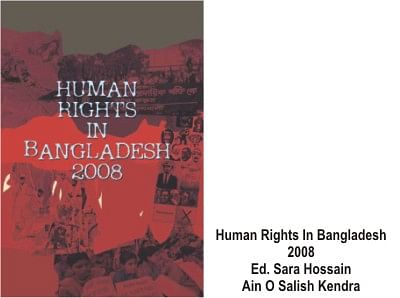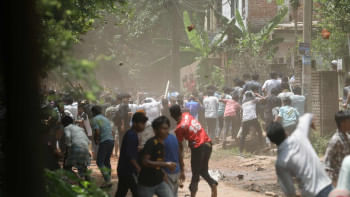A matter of human rights . . .

The year 2008 began with uncertainty and restlessness amongst everyone. The state of emergency had already entered its second year and there seemed to be no progress in the political landscape of the country to restore democracy. The end of the year was a climax of sorts as the national elections, which was termed as the most 'free and fair' election in Bangladesh to date took place with the highest number of voter turnout ever seen. What happened in between the months of January and December in terms of human rights violations is what is reported in 'Human Rights in Bangladesh in 2008', brought out by human rights watchdog organisation Ain o Salish Kendro (ASK).
'Institutional Developments' examines how continuing restraints under the State of Emergency (SoE) affected the functioning of institutions of justice, including shifts in the direction of the anti-corruption drive as the impetus to the holding of elections gathered momentum. 'Legislative And Policy Developments' outlines new laws and policies adopted or proposed during the year, which impacted on human rights. 'Judgments On Fundamental Rights' examines judgments on the interpretation of the Emergency Powers Rules (EPR) in relation to the issue of liberty and fair trial, and then considers the few cases reported during the year on the right to life, freedom of assembly and workers' rights. 'Right To Life' describes the incidents of extra-judicial deaths by law enforcement agencies, including border forces, mob violence and in inter party conflicts. 'Right To Liberty' focuses on the stresses and strains put on the right to bail during the SoE and highlight the paradoxical approaches of the higher judiciary in granting bail. 'Right To Fair Trial' addresses the fair trial protections afforded to individuals accused in criminal cases, particularly the right to a speedy and public trial by an independent and impartial court or tribunal established by law. 'Right To Freedom From Torture And Ill-Treatment' reports on allegations of torture by law enforcement agencies and the absence of any corrective action. 'Right To Freedom Of Expression' examines the positive and negative implications of the Right to Information Ordinance, and discusses the constraints imposed by the State of Emergency (SoE). 'Right To Assembly And Freedom Of Association' examines the rollback of Emergency Rules to allow full political activity and trade union activity as well as the selective application of such rules to allow protests by religious right groups amongst a few others while severe restrictions continued to apply to others.
'Right To Food' discusses the right to food situation of Bangladesh in 2008 including food security and food sovereignty. 'Right To Shelter' discusses key developments of 2008 relating to right to shelter including judicial development, demolition of slum and forcible eviction, alternative resettlement scheme for the evicted persons. 'Right To Health' examines measures taken by the Government regarding access to health care services, its regulatory role, and responses, etc. 'Right To Education' identifies the reasons for the poor quality of education due to inadequate budgets, poor and untimely textbook production in the primary sector, low quality of secondary school teachers, corruption, lack of regulation in public and private universities, and bias in policy making.
'Rights Of Women' discusses some significant measures taken with regard to framing of laws and policies on women' rights -- most notably on the restoration of the National Women's Development Policy, framing of laws on the right to freedom from violence and equality and on women's political participation. 'Rights Of Religious Minorities' reviews the latest situation regarding the continued application of the Vested Property Act (VPA) and efforts for further amendments of the law, as well as specific incidents of violence against individuals and property owned by religious minorities. 'Rights Of Indigenous Peoples' examines the situation in the CHT, then in the plains, focusing mainly on land rights, civil rights as well as socio-economic rights in each case. 'Rights Of Linguistic Minorities' discusses developments in 2008 in particular the recognition of the right to citizenship of the Urdu-speakers and consequently to vote, in the context of the history of this community in Bangladesh. 'Rights Of Workers' discusses the major events in the struggle of RMG and jute mill workers for their right during the year. 'Rights Of Migrant Workers' describes the unfair conditions faced by migrant workers in countries of the Middle East.
'Right Of Children' examines the progress in national laws, policies, and judicial decisions to protect child rights and assesses the actual situation of child rights in Bangladesh in 2008. 'Rights Of Persons With Disabilities' discusses the discriminatory policies and practices that stand in the way of equal opportunity for persons with disabilities. 'Rights Of Sexual Minorities' begins to articulate the rights of sexual minorities in Bangladesh in mainstream human rights discourse by mapping some of the problems faced by the MSM and Hijra communities. 'Rights Of Prisoners' describes how little has changed in the conditions of ordinary prisoners and documents how an unusual number of high profile inmates were able to access special privileges and violating the rules and regulations. There is a set of recommendations by the authors along with all the issues.
The book is edited by Sara Hossain and the writers are ATM Morshed Alam, Abdullah Al Faruque, John Asit Das, Shah Alam Faruk, Mozammel Haque, Hameeda Hossain, Millat Hossain, Sara Hossain, Annu Jalais, Khushi Kabir, Mizanur Rahman Khan, Naeem Mohaiemen, Shah Afroditi Panna, Faustina Pereira, Hana Shams Ahmed, Rezanur Rahman, Shohana Shabnam, Md. Shahiduzzaman, Tanim Hossain Shawon, Dina M. Siddiqi, and Sontosh Tripura.

 For all latest news, follow The Daily Star's Google News channel.
For all latest news, follow The Daily Star's Google News channel. 



Comments